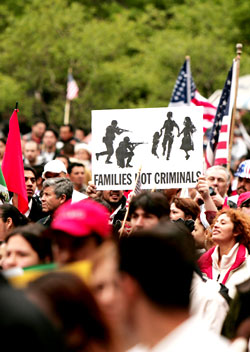By Ron Walters
-Guest Columnist-
The Basis Of Black-Latino Unity Is Not Political (BEC, 07-24-2001)

In between the reticence of the Black leadership to fully discuss the problem of immigration, especially as it affects the demands of the Latino population and the resentment of their constituents to those demands, is the necessity to consider rationally the content of an agenda that will unite the potential power of both.
Thus far, the voices of civil rights and political leaders are either stilled or supportive of a progressive approach to immigration that does not take into consideration the resentment of the rank and file Black working class. Their acknowledgment of the civil and human rights of Latinos is, therefore, considered one-sided and incomplete by many of their constituents. My task, then, is to propose measures that would construct the other side of the agenda, so that the progressive content of Black support for the Latino mobilization could be respectful of Black interests, as well.
To begin with, Blacks should strongly support the current mobilization of Latinos for measures that would result in the legalization of their status as workers and citizens. Public opinion polling indicates that Blacks favor limiting further illegal immigration, though one would doubt by the means proposed by President George Bush that favors militarizing the U.S. border.
In exchange for Black support, however, there are three considerations that might be addressed to the Latino community:
First, limiting further illegal, low-wage labor should not be focused on criminalizing those who cross the border, but those who provide the incentive for them to come. Employers are practicing racial discrimination against Blacks in the labor market, which was prohibited by the 1964 Civil Rights Act, Title VII. Blacks are excluded from work opportunity by employers seeking low-wage workers and, since in the process, they sanction the exclusion of Blacks from the labor force, as such, should be prosecuted for such violations.
Second, Latino managers who procure workers should be made sensitive to the necessity and legality—to secure Black workers. In some areas, I have seen them include Black workers as a part of groups they hire for jobs in hotels, restaurants, construction or other day jobs, but not frequently. More often, such managers are part of the system of racial segregation of the labor groups delivered to employers.
Third, Latino laborers should push for higher wages and benefits through unionization. A great model exists in the efforts of the Service Employers International Union (SEIU), a group that has enrolled thousands of Latino service workers. Latinos could re-energize the American labor movement if they take the new-found courage to protest and demonstrate, not only into the ballot box, but into the labor halls, as well.
Fourth, Latino leaders and civic activists should organize their constituents into a new force for state campaigns to achieve living wage and minimum wage legislation, where such legislation has been blocked on a national level. This could also assist Blacks and other low-wage populations to enter jobs at wages that, though they may not be sufficient, would more effectively contribute to family budgets and consequently to the viability of their members.
The stakes of developing a respectful coalition between Blacks and Latinos is that rank-and-file Blacks who are resentful of Latinos’ gains could be brought along if they see them fighting for a common agenda that lifts their own access to opportunity. But leadership is necessary in crafting such an agenda, not in denying that a problem exists. Leadership is vital because the stakes in developing a strong and effective coalition based an agenda, respectful of both interests, are so high.
Black leaders need to both support the Latino mobilization more forcefully and from the perspective of the interests of their community, especially those who are most affected by the growing presence of the Latino population. In this, they must help to craft a respectful agenda that is the glue of a strong and effective coalition.
Then, as the Latino mobilization continues, it needs to consider expanding its agenda. I am aware of the debate within that community over these tactics, but it should not be considered just as tactics, but a grand strategy for achieving long-term objectives. It may be that in the urgency of the moment, a narrow agenda is best to fuel organizing, but at some point soon the Latino community should join ranks with the low-wage American working class and push hard in the direction of change. In this respect, the demand for citizenship has a price. (Ron Walters is the professor of Government and Politics at the University of Maryland College Park.)












